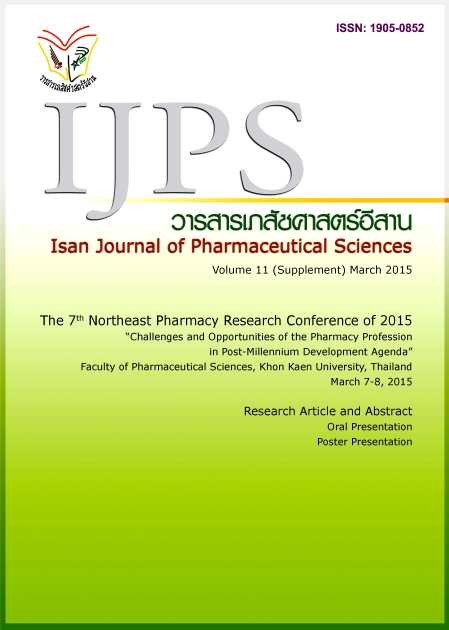Development of a tool for predicting the risk of chronic kidney stage 4 in type 2 diabetic patients
Main Article Content
Abstract
Introduction: Diabetes is a major cause of chronic kidney disease (CKD) that will progress to end-stage renal disease (ESRD). Patients with CKD progression rates are faster and high mortality rates. Objective: This study aimed to develop screening tool to assess risk factors for chronic kidney disease stage 4 in patients with type 2 diabetes. Materials and Methods: This research was retrospective study. The participants of the study were patients with type 2 diabetes, but non - CKD stage 4 by the CKD- EPI equation with the data on a computer database of the hospital since October 1, 2007 to September 30, 2009 (baseline) and trace ongoing average 4.85 years. Results: There were 914 patients with type 2 diabetes participated in the study. Among those, 69 patients developed CKD stage 4 and the incidence of its occurred in patients was 7.5%. The risk factors associated with CKD stage 4 from binary logistic regression analysis including age (>60 years), gender (female), A1C (≥7%), triglyceride levels (≥150 mg/dl) and Low Density Lipoprotein levels (≥100 mg/dl). When integrating risk factors into the screening tool, the cut-off point for CKD stage 4 prediction is equal to 12 (0-19). The sensitivity was 81.20 percent, specificity was 52 percent Conclusion: The screening tool for the risk of CKD stage 4 prediction should be performed by the medical staff in screening patients with type 2 diabetes. It is recommended that all patients with a score ranging from 12 to 19 points should be examined by nephrologist to prevent severe complications as a consequence.
Article Details
In the case that some parts are used by others The author must Confirm that obtaining permission to use some of the original authors. And must attach evidence That the permission has been included
References
American Diabetes Association. Standards of medical care in diabetes—2012. Diab Care 2012; 35 (suppl 1): S11-S41.
American Diabetes Association. Standards of medical care in diabetes—2014. Diab Care 2014; 37 (suppl 1): S14-S80.
Bang H, Vupputuri S, Shoham DA., Klemme, et al. SCreening for Occult REnal Disease (SCORED). Arch Intern Med 2007; 67: 374-81.
Chirawatkul A. Biostatistics for Health science research. Khon Kaen: Faculty of Public Health, Khon Kaen University; 2004.
Iseki K, Tozawa M, Ikemiya Y, et al. Relationship between dyslipidemia and the risk of developing end- stage renal disease in a screened cohort. Japanese Society of Nephrology 2005; 9: 46-52.
Jamal S & Arthur C. Factors affecting the progression of diabetic nephropathy and its complications: a single center experience in Saudi Arabia. Ann Saudi Med 2011; 31(3): 236-242.
Jenkriangkrai S. The Prevalence of Chronic Kidney Disease in Periodic Health Checkup at Maharat Nakhon Ratchasima Hospital, Nakhon Ratch Med Bull 2008; 32 (Suppl1): S158-S165.
KDIGO Blood Pressure Work Group. KDIGO clinical practice guideline for the management of blood pressure in chronic kidney disease. Kidney Int Suppl 2012; 2: 337-414.
K/DOQI Clinical Practice Guidelines for Chronic Kidney Disease: Evaluation, Classification and Stratification. Am J Kidney Dis 2002; 39 (Suppl 1), S1-S287.
Kerdchantuk C. Appropriate screening tool to identify undiagnosed chronic kicney disease in primary care. Khon Kaen University 2009.
Kerdchantuk C, Chaiyakum A, Kessomboon N, et al. Self- Assessment Symptoms and Risk Factors for Chronic Kidney Disease Screening in Primary Care. J. Nat. Sci, 9(1), 39 – 47.
Lueangchiranothai P, Sitthilaw S & Muenpa R. Compliance in Oral Antidiabetic Agent Utilization and Glycemic Control: A Case Study at Internal Medicine Special Clinic. Thai Journal of Hospital Pharmacy 2007; 17(3): 223-30.
Mikkata P. Progression and outcomes of chronic kidney disease patients in district hospitals. Khon Kaen University, 2009.
Nephrology society of Thailand. The Manual management of Patients with chronic kidney disease early Stage. Bangkok, Thailand 2012.
Srisuwannaphop P, Kanchanaphibool I. The Journal of National Conference (second) in graduate study, Graduate School, Silpakorn University 2011;1115-1128.
World Health Organization.Diabetes mellitus [Online]. 2012 Sep 15 [Cited 2012 Sep 30]. Available from: http://www.who.int/mediacentre/factsheets/fs138/en/


